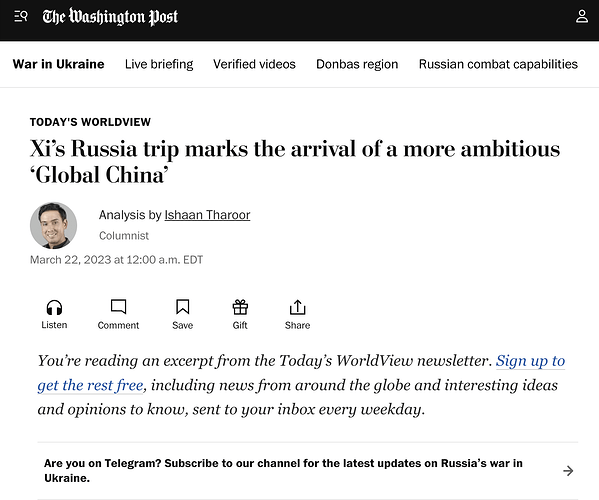-
在中国国家主席习近平访问俄罗斯的第二天,两国同意了一系列将扩大天然气贸易以及其他经济关系的建议。拟议的交易代表了俄罗斯总统弗拉基米尔-普京的生命线,由于他决定在乌克兰边境发动全面战争后对俄罗斯实施制裁,俄罗斯被西方孤立。莫斯科讨论的中心是一条新的计划中的管道,被称为 “西伯利亚之力2号”,每年可向中国提供约500亿立方米的俄罗斯天然气。
-
普京说,到2030年,俄罗斯将通过新管道向中国供应至少980亿立方米的天然气,此外还有1亿吨的液化天然气。克里姆林宫对中国经济的巨大胃口和要求表示感谢。"普京在周二的会议后对记者说:"俄罗斯企业有能力满足中国经济对能源载体日益增长的需求,包括在目前的项目框架内和现在正在谈判的项目中。
-
莫斯科的一些观察家认识到,一个也许是屈辱的新现实正在扎根。"事件的逻辑决定了我们完全成为中国的资源殖民地,"一位与克里姆林宫关系密切的消息人士告诉《金融时报》,然后指出中国科技公司在俄罗斯境内的作用正在扩大。“我们的服务器将来自华为。我们将成为中国所有东西的主要供应商。他们将从西伯利亚之力获得天然气。到2023年底,人民币将成为我们的主要贸易货币。”
-
去年,中国国家主席习近平公布了 “全球安全倡议”,作为西方主导的全球安全秩序的替代方案。
-
批评者称该倡议的原则是 “陈词滥调”,但分析家认为这是一个摆脱美国建立的联盟体系和全球安全架构的举措。
-
中国官员一直在宣传 "GSI "是一个全球伙伴关系的平台,一些外国同行对这种言论表示欢迎。
-
北京一直在构建一个新的、主要是亚洲的全球秩序,这主要是经济性质的,有 "一带一路 "倡议等举措。
-
中国也正在成为一个更有能力的政治行为体,从他们最近调解沙特阿拉伯和伊朗之间的和解就可以看出。
-
然而,中国并没有推动任何有意义的努力来实现俄罗斯和乌克兰之间的和平。
-
中国的地区影响力正在从经济交流扩展到通过谈判解决冲突。
-
北京正试图在破坏美国的国际形象的同时提高自己的国际形象,并将自己定位在利用冲突中的任何结果。
-
退役上校周波将此描述为 “全球中国”,指出中国的影响力 “无处不在”。
-
拜登政府对中国采取了对抗的态度,参与贸易战,收紧地区安全伙伴关系,并引导自由民主国家和专制国家之间的意识形态冲突。这种鹰派立场在其他国家中引起了紧张,他们希望美国能与其他地区大国一起平衡中国的影响力。
-
CNN主播Fareed Zakaria在为《华盛顿邮报》撰写的专栏文章中对华盛顿的僵化思维表示担忧,这使得与专制政权的对话变得困难,并让中国在世界舞台上发挥了更积极的作用。他认为,美国的单极地位已经腐蚀了该国的外交政策精英,导致了一种主要侧重于提出要求和发出威胁及谴责的方法。
-
相比之下,北京声称采取了一种更加平和的方法,即注重理解对方的观点并进行谈判。这是否属实还有待观察。
-
拜登政府对中国采取了对抗的态度,参与贸易战,收紧地区安全伙伴关系,并引导自由民主国家和专制国家之间的意识形态冲突。这种鹰派立场在其他国家中引起了紧张,他们希望美国能与其他地区大国一起平衡中国的影响力。
-
CNN主播Fareed Zakaria在为《华盛顿邮报》撰写的专栏文章中对华盛顿的僵化思维表示担忧,这使得与专制政权的对话变得困难,并让中国在世界舞台上发挥了更积极的作用。他认为,美国的单极地位已经腐蚀了该国的外交政策精英,导致了一种主要侧重于提出要求和发出威胁及谴责的方法。
-
相比之下,北京声称采取了一种更加平和的方法,即注重理解对方的观点并进行谈判。这是否属实还有待观察。
-
On the second day of Chinese President Xi Jinping’s visit to Russia, the two countries agreed to a set of proposals that would expand their natural gas trade as well as other economic ties. The proposed deals represent something of a lifeline for Russian President Vladimir Putin, isolated from the West because of sanctions imposed on Russia after his decision to wage a full-blown war across the border in Ukraine. At the center of discussions in Moscow is a new planned pipeline, dubbed Power of Siberia 2, which could supply China with about 50 billion cubic meters of Russian gas annually.
-
By 2030, Putin said, Russia will supply China with at least 98 billion cubic meters, in addition to 100 million tons of liquefied natural gas, through the new pipeline. The Kremlin is grateful for the vast appetite and requirements of the Chinese economy. “Russian business is in a position to meet the growing demand from the Chinese economy for energy carriers both within the framework of current projects and those that are now in the process of negotiation,” Putin told reporters after Tuesday’s meetings.
-
Some observers in Moscow recognize a perhaps humiliating new reality taking root. “The logic of events dictates that we fully become a Chinese resource colony,” a source closely linked to the Kremlin told the Financial Times, before pointing to the expanding role of Chinese tech companies within Russia. “Our servers will be from Huawei. We will be China’s major suppliers of everything. They will get gas from Power of Siberia. By the end of 2023 the yuan [renminbi] will be our main trade currency.”
-
Last year, Chinese President Xi Jinping unveiled the “Global Security Initiative” as an alternative to the Western-led global security order.
-
Critics have called the initiative’s principles “platitudes”, but analysts see it as a move to shift away from the alliance systems and global security architecture established by the U.S.
-
Chinese officials have been promoting the “GSI” as a platform for global partnership, and some foreign counterparts have welcomed the rhetoric.
-
Beijing has been constructing a new, mainly Asian global order, which has been largely economic in nature, with initiatives like the Belt and Road Initiative.
-
China is also becoming a more capable political actor, as seen in their recent mediation of rapprochement between Saudi Arabia and Iran.
-
However, China is not driving any meaningful effort towards peace between Russia and Ukraine.
-
China’s regional influence is expanding from economic exchange to negotiated conflict resolution.
-
Beijing is attempting to burnish its international image while undermining the U.S.’s, and positioning itself to take advantage of whatever comes out of the conflict.
-
Retired colonel Zhou Bo described this as “Global China”, noting that China’s influence is “everywhere”.
-
The Biden administration has taken a confrontational approach to China, engaging in a trade war, tightening regional security partnerships, and leading an ideological clash between liberal democracies and autocracies. This hawkish stance has caused tension among other countries, who want the US to balance China’s influence alongside other regional powers.
-
CNN anchor Fareed Zakaria has expressed concern in an op-ed for The Washington Post about Washington’s rigid thinking, which has made dialogue with autocratic regimes difficult and allowed China to take a more proactive role on the world stage. He believes that America’s unipolar status has corrupted the country’s foreign policy elite, leading to an approach that is primarily focused on making demands and issuing threats and condemnations.
-
In contrast, Beijing has claimed to be taking a more levelheaded approach, one that is focused on understanding the other side’s views and negotiating. Whether this is true or not remains to be seen.
https://www.washingtonpost.com/world/2023/03/22/xi-global-china-russia-order/
